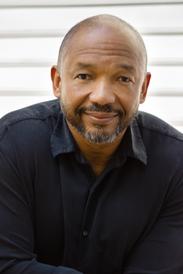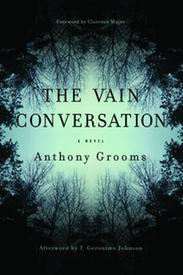
|
|
| photo: JD Scott | |
Tender storytelling has been a prevailing characteristic of Anthony Grooms's fiction as he focuses on the African American social struggles of Jim Crow and the Civil Rights Movement. He is the author of Trouble No More and Bombingham. Ron Rash said that Grooms's new novel, The Vain Conversation (Story River Books/Univ. of South Carolina, March 1, 2018), "achieves what only the best literature can give us. When we finish the last page, the book is not finished with us. It will haunt us."
On your nightstand now:
I don't read in bed so there are no books on my nightstand. But in my basement, beside my old leather chair on a stool my wife bought in Ghana, is a tall stack. As for fiction, I finished Gray Stewart's Haylow, a poignant satire about a white professor at a black college, and Elnathan John's Born on a Tuesday, about a young Muslim man's coming-of-age in Nigeria. I also loved John Holman's Triangle Ray, a witty character study set in Raleigh, and Andrew Plattner's Offerings from a Rust Belt Jockey, about a down-and-out jockey.
As for nonfiction, there is Walter Biggins and Daniel Couch's Bob Mould's Workbook about the Hüsker Dü guitarist, and Journeys Within: The Contemporary Spiritual Autobiography by Kerstin W. Shands. I am enjoying the chapter on near death experiences. I just added Ruth C. Yow's Students of the Dream. I am interested to learn more about re-segregation in schools near my home. And I'm looking forward to adding Tayari Jones's novel An American Marriage to the stack.
Favorite book when you were a child:
I was a science nerd. I carried Dorothy Bennett's Golden Encyclopedia everywhere. I would have it today, if it hadn't burned in a house fire.
Your top five authors:
Oh, this seems too much like asking for trouble. Whenever you have a favorite author, he or she somehow disappoints you. Rather, I have favorite pieces, like Carl Sandburg's "Chicago." It was my first literary a-ha. There're also James Baldwin's The Fire Next Time for its articulation of race in America; Ernest Hemingway's "Soldier's Home" and Audre Lorde's "Power," both influential on my own writing. And though it does not exhaust the list, let's throw in H. Rider Haggard's She and Allan. It's largely imperialistic adventure, but has moments of surprising spiritual depth. But ask me this question again tomorrow.
Book you've faked reading:
Like so many others, the Bible. Book you're an evangelist for:
Book you're an evangelist for:
As of late, Michelle Alexander's The New Jim Crow. As a black American, most of what she says is familiar to me. But she builds an articulate and alarming case for the drug war as a race control system.
Book you've bought for the cover:
Like the way I buy wine? Probably the sci-fi books I read as a kid. I am still attracted to a cover with a rocket ship or alien planet on the cover.
Book you hid from your parents:
My parents encouraged reading. My mother even left the medical encyclopedia for me to find. Easier than explaining the birds and the bees! I was out of the house by the time I was reading Playboy--so there was no suppression of literature where I grew up.
Book that changed your life:
Every good book does in some way. I recall, when I was about 10, being astonished by Carl Sandburg's "Chicago." I couldn't make out that it was a poem since it wasn't the doggerel I was used to. In it, I discovered a dynamism in language that was fascinating and beautiful. I had composed poems before that moment, but then, a door opened to the complex wonder of language. Another impactful read was Huston Diehl's Dream Not of Other Worlds. It is about school segregation in the county I grew up in. It explained to me a lot about my parents.
Favorite line from a book:
"Welcome again, my children, to the communion of your race" is what the Devil says to Young Goodman Brown in the Hawthorne story. It is the way I greet my writing students. They don't always get the meaning.
Five books you'll never part with:
I have tried this kind of experiment when trying to downsize the bookshelf. It's an impossible thing to decide. One day I'll just get rid of them all and start over again. At this moment, I am thinking: Whitman's Leaves of Grass--it's great for reading out loud, sonorously. Burnham's Celestial Handbook--it's terribly out of date, but filled with interesting star facts. The Daybooks of Edward Weston--I read it like a psalter (though I keep it in the toilet). A book of Mark Rothko's paintings. And a tattered copy of the Colonial Williamsburg Official Guidebook--to remind me of my college days.
Book you most want to read again for the first time:
I think John Christopher's The White Mountains, the first in the Tripods trilogy. It was the first book I read in one sitting.
Topics are you most passionate about:
I take an interest in many things, but certain themes almost always bring tears to my eyes. One is social struggle. It's likely because I grew up in de facto segregation and witnessed its degradation on my family that any story, regardless of when or where, of social struggle gets my blood boiling. But I am also moved by stories of alienation. Especially stories about people who witness something extraordinary--an epiphany, a UFO, a ghost--that sets them apart from their communities. Such stories remind me that the universe is a mysterious place and each of us is on a personal adventure in it.

